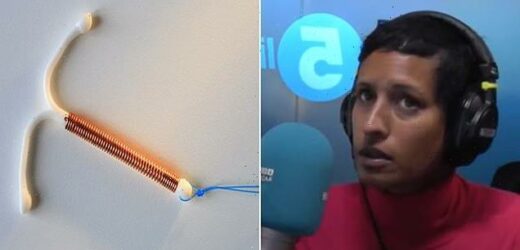Women should ALWAYS be offered pain relief when they have the coil fitted, medics say
- Faculty of Sexual Reproductive Healthcare said pain killer should be an option
- Naga Munchetty said the coil was ‘one of the most traumatic experiences’
- NHS guidelines say women should be offered pain killers before the procedure
Women should always be offered pain relief when they have the coil fitted, medics say.
The Faculty of Sexual and Reproductive Healthcare — which advises nurses and doctors — said today it should always be an option.
They made the statement after BBC presenter Naga Munchetty, 46, said having the device fitted was ‘one of the most traumatic physical experiences I have had’.
She said she fainted twice after experiencing ‘excruciating’ pain while having the contraceptive device inserted into her body, and was not offered any anaesthetic.
Munchetty told BBC Radio 5 Live she has a high pain threshold, but the procedure was ‘one of the most traumatic physical experiences I have had’.
The coil, or IUD, is inserted into the uterus and prevents pregnancies by releasing copper, which kills sperm, and stopping eggs binding to the uterine walls.
NHS guidelines say that women should be offered pain killers before they have the device fitted.
Some women can suffer pains similar to period cramps after getting the device —but a few may face serious pain and anxiety.
It is not clear how many women in the UK have the coil, but in the US it is thought more than a million women rely on it as contraception.
Experts at the Faculty of Sexual and Reproductive Healthcare said today that pain killers should always be offered when someone gets the coil fitted
It comes after Naga Munchetty said getting one fitted was ‘one of the most painful traumatic physical experiences I have had’
The FSRH said in June that it would ‘share updated clinical guidance on this matter and work with our members to share best practice to ensure women experience the highest standards of IUD care’.
It has now issued a statement which says that ‘women should always be offered pain relief in IUD procedures’.
It said for many women, the pain associated with an IUD is similar to period cramps, but for some the experience is painful and anxiety-provoking.
The FSRH said there is no clear best pain relief option to alleviate pain associated with the insertion of intrauterine contraception.
But it recommends that healthcare workers ‘create a supportive environment and offer appropriate analgesia when women attend their intrauterine device fitting procedures’.
The IUD, a small, T-shaped copper device that is inserted in the uterus, creates a hostile environment for sperm, preventing pregnancy.
It can be used as emergency contraception up to five days after intercourse – a move which is particularly recommended when a woman is ovulating (14 days between her periods) since the morning after pill (‘Plan B’ in America) is less effective at that time.
It also provides long-term contraception which can last for up to 10 years.
There are two kinds: the hormonal (Mirena) coil, and the non-hormonal (copper) coil.
The hormonal coil can stay in the uterus for 10-15 years, and is associated with lighter periods.
Though the non-hormonal coil is sometimes associated with heavier periods, it has gained popularity as one of the few forms of contraception that sidestep the side effects of hormonal contraception in women, such as mood swings and skin problems.
Dr Janet Barter, vice president of the FSRH, said: ‘It is always concerning to hear about the pain some women have experienced during their IUD fitting, and this has sparked an important discussion amongst healthcare professionals and IUD users.
‘FSRH training in intrauterine contraception includes teaching on analgesics.
‘We review evidence regularly in order to incorporate any proven new technique into our clinical guidance to support best practice, so that women can experience high-quality contraceptive care.
‘Although this is not new, we recommend healthcare professionals to create a supportive environment and offer appropriate analgesia.
‘In my experience many women decline the offer, but the option should be there. Not all clinics or GP practices are able to offer local anaesthesia, and where this is the case, referral to another service should be in place.
‘We also need to ensure that the patient is aware that they can request that the procedure stops at any time. It is important to be mindful that some individuals do report severe pain associated with the procedure.
‘For many women, however, the pain associated with an IUD fitting is similar to experiencing period cramps and they don’t experience major issues.’
In June, health minister Nadine Dorries said that she was ‘appalled’ to hear of reports of women suffering pain when having a coil fitted.
She told the Health and Social Care Committee: ‘No woman should suffer as a result of having an IUD or other scope procedures’.
IUDs are used as a form of contraception and are sometimes recommended for other issues including heavy periods.
According to nhs.uk, an IUD is a small T-shaped plastic and copper device that is put into the womb and releases copper to stop a woman from becoming pregnant.
Source: Read Full Article



